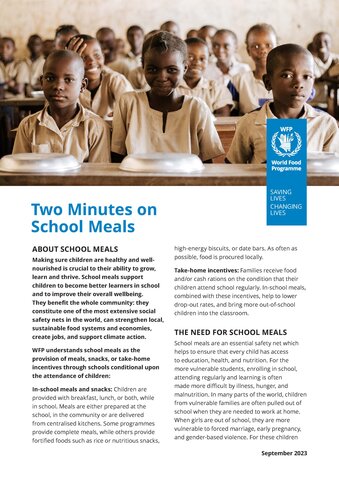
While the world is still facing multiple crises due to conflict, climate change, and rising food and fuel prices, governments worldwide are increasingly convinced that school meals are a powerful and cost-effective way of ensuring that vulnerable children get the food they need and have made school meals one of their priorities.
More than 85 countries and 95 partners have joined the School Meals Coalition, a country-led initiative that strives for every child to have the opportunity to receive a healthy, nutritious meal in school by 2030. Thanks to political leadership, 418 million children benefit from school meals worldwide today, 30 million more than before the pandemic in early 2020.
WFP supports the Coalition by acting as its secretariat. In addition, in 2022, WFP supported governments worldwide to establish or expand national school feeding programmes, while also directly providing healthy meals, snacks or cash-based transfers in 59 countries.
| Document | File |
|---|---|
| Two Minutes on School Meals 2022 - English |
PDF | 1.11 MB
Download
|
| Two Minutes on School Meals 2022 - French |
PDF | 300.95 KB
Download
|
| Two Minutes on School Meals 2022 - Spanish |
PDF | 293.48 KB
Download
|
| Two Minutes on School Meals 2022 - Arabic |
PDF | 394.31 KB
Download
|
| Two Minutes on School Meals 2021 - English |
PDF | 657.81 KB
Download
|


